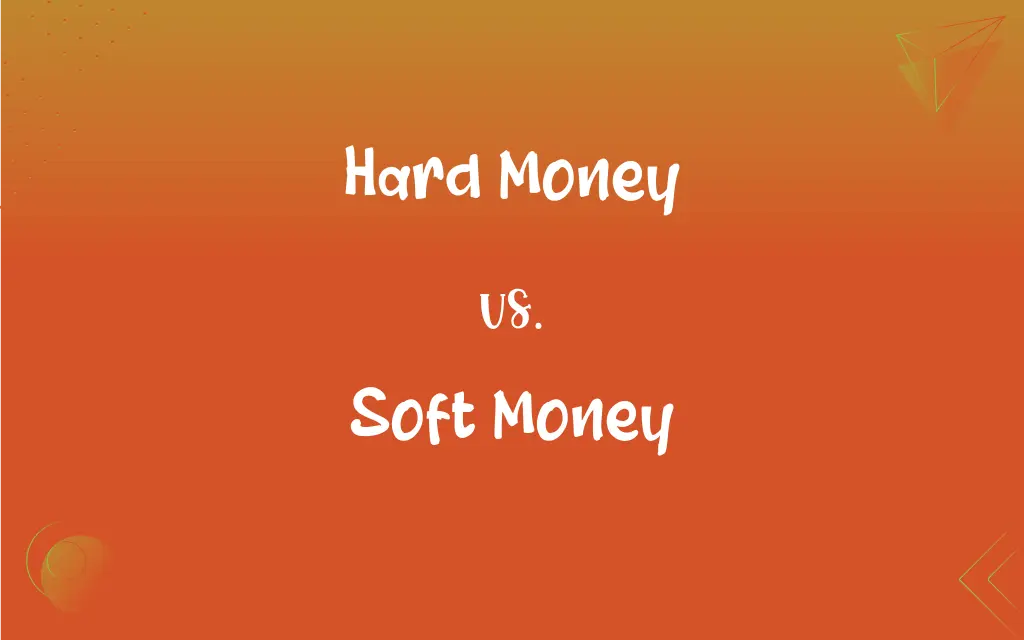Hard Money vs. Soft Money: What's the Difference?
Edited by Aimie Carlson || By Harlon Moss || Updated on October 25, 2023
Hard money refers to physical currency or assets, while soft money relates to campaign contributions or political donations not regulated by federal law.

Key Differences
Hard money often represents tangible assets. It's a term frequently used in the context of loans where real estate serves as collateral, ensuring the loan is backed by something of value. Soft money, on the other hand, tends to refer to political contributions that are not subject to federal regulations. While hard money has a more concrete foundation, soft money is often more fluid and less strictly regulated.
In real estate, hard money loans are typically short-term loans given by private investors or companies. The interest rates for these loans are typically higher than traditional bank loans. Soft money, by contrast, relates to the political realm. Soft money donations are given to political parties for general "party-building" activities, and aren't regulated as strictly as contributions directly to candidate campaigns.
The sources of hard money and soft money are distinct. Hard money typically comes from financial institutions or private investors who require collateral and consider the borrower's ability to repay. Soft money, however, often flows from donors to political organizations or parties, usually with the understanding that the funds will indirectly benefit a particular candidate or cause.
Hard money is more stringent in terms of lending requirements, demanding collateral and a clear path for repayment. Soft money, in its political sense, tends to bypass federal contribution limits by being donated to political parties instead of directly to candidates, offering a workaround to traditional contribution ceilings.
In essence, hard money has a direct, tangible value, often tied to physical assets. Soft money, conversely, holds a more abstract value, linked to influence in the political realm and less concrete in its form and regulations.
ADVERTISEMENT
Comparison Chart
Definition
Physical currency or tangible asset
Unregulated political contributions
Context
Real estate and loans
Politics
Regulation
Strict
Less Strict
Typical Sources
Financial institutions, investors
Political donors
Main Usage
Collateral-backed loans
Political party support and influence
ADVERTISEMENT
Hard Money and Soft Money Definitions
Hard Money
Funds lent against a tangible asset as collateral.
The investor provided a hard money loan, using the property as security.
Soft Money
Money whose value is not based on a physical commodity.
In contrast to the gold standard, fiat currencies are considered soft money.
Hard Money
Physical coins and paper currency.
He paid in hard money, rather than using a credit card.
Soft Money
Political contributions not strictly regulated by federal law.
Soft money donations often go towards party-building activities.
Hard Money
Strictly regulated political contributions.
His campaign was primarily funded through hard money donations.
Soft Money
Financial assistance with flexible terms or requirements.
The university offered soft money grants to promising researchers.
Hard Money
Capital that is quickly available for investment or business ventures.
Start-ups often seek hard money from angel investors.
Soft Money
Unsecured funding without tangible collateral.
He was looking for soft money lenders for his innovative project.
Hard Money
Currency that is backed by a physical commodity such as gold.
Gold-backed currencies were considered hard money due to their tangible value.
Soft Money
Funds used for general purposes and not specified projects.
The organization had a considerable amount of soft money for operational expenses.
FAQs
How is soft money usually used in politics?
Soft money typically refers to political contributions not regulated by federal law.
Can hard money relate to political contributions?
Yes, when referring to strictly regulated political contributions.
Are hard money loans typically long-term or short-term?
Hard money loans are typically short-term loans.
What's the main difference in regulation between hard money and soft money donations?
Hard money donations are strictly regulated, while soft money donations are less strictly regulated.
Does soft money bypass federal contribution limits?
Yes, soft money often bypasses federal limits by being donated to political parties rather than candidates.
Can soft money be used directly for campaign expenses?
Soft money is typically used for general party-building activities, not specific campaign expenses.
Who typically provides hard money loans?
Private investors or companies, often specializing in real estate.
Can hard money be considered a fiat currency?
No, fiat currencies are typically considered soft money since they aren't backed by a physical commodity.
Are soft money donations transparent?
While they are recorded, soft money donations can obscure the intended beneficiary since they're given to parties rather than specific candidates.
Are hard money loans always more expensive than traditional loans?
Typically, hard money loans have higher interest rates due to their short-term nature and associated risks.
Is hard money always backed by physical assets?
Not always, but it often is, especially in the context of loans.
What backs the value of hard money?
Hard money is often backed by tangible assets or a physical commodity like gold.
What are the risks of accepting soft money in politics?
Accepting soft money can lead to perceptions of undue influence or corruption.
Why might someone choose a hard money loan over a traditional bank loan?
Hard money loans can be obtained more quickly and with less bureaucracy, especially if there's tangible collateral.
Is soft money more flexible than hard money?
In a political context, soft money is more flexible and less strictly regulated than hard money.
Why is soft money controversial in politics?
Soft money can allow donors to exert influence without the same level of transparency and regulation as hard money contributions.
What does hard money represent?
Hard money often represents tangible assets or physical currency.
Can individuals provide hard money loans?
Yes, individual investors can offer hard money loans.
How do soft money donations benefit political candidates?
Soft money can indirectly benefit candidates by supporting party-building activities, voter turnout efforts, and general advocacy.
Is soft money always linked to politics?
No, but it's most commonly used in a political context.
About Author
Written by
Harlon MossHarlon is a seasoned quality moderator and accomplished content writer for Difference Wiki. An alumnus of the prestigious University of California, he earned his degree in Computer Science. Leveraging his academic background, Harlon brings a meticulous and informed perspective to his work, ensuring content accuracy and excellence.
Edited by
Aimie CarlsonAimie Carlson, holding a master's degree in English literature, is a fervent English language enthusiast. She lends her writing talents to Difference Wiki, a prominent website that specializes in comparisons, offering readers insightful analyses that both captivate and inform.































































